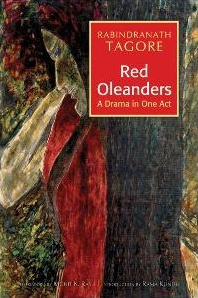

“যক্ষপুরীর হাওয়ায় সুন্দরের পরে অবজ্ঞা ঘটিয়ে দেয়, এইটেই সর্বনেশে। নরকেও সুন্দর আছে, কিন্তু সুন্দরকে কেউ সেখানে বুঝতেই পারে না, নরকবাসীর সব চেয়ে বড়ো সাজা তাই।”
― Rabindranath Tagore, quote from Red Oleanders
“স্বয়ং বিধির কৃপায় মদের বরাদ্দ জগতের চার দিকেই, এমন-কি, তোমাদের ঐ চোখের কটাক্ষে। আমাদের এই বাহুতে আমরা কাজ জোগাই, তোমাদের বাহুর বন্ধনে তোমরা মদ জোগাও। জীবলোকে মজুরি করতে হয়, আবার মজুরি ভুলতেও হয়। মদ না হলে ভোলাবে কিসে।”
― Rabindranath Tagore, quote from Red Oleanders
“: বাজে কথা বাদ দিয়ে আসল কথা আদায় করাই তো পণ্ডিতের অভিপ্রায়।
: কিন্তু বিধাতার নয়। তিনি আসল জিনিস সৃষ্টি করেছেন বাজে জিনিসকে লালন করবার জন্যে। তিনি সম্মান দেন ফলের আঁঠিকে, ভালোবাসা দেন ফলের শাঁসকে।”
― Rabindranath Tagore, quote from Red Oleanders
“: রাজা বলে, পুরাণ বলে কিছুই নেই। বর্তমান কালটাই কেবল বেড়ে বেড়ে চলেছে।
: পুরাণ যদি নেই তা হলে কিছু আছে কী করে? পিছন যদি না থাকে তো সামনেটা কি থাকতে পারে?
: রাজা বলেন, মহাকাল নবীনকে সম্মুখে প্রকাশ করে চলেছে, পণ্ডিত সেই কথাটাকে চাপা দিয়ে বলে : মহাকাল পুরাতনকে পিছনে বয়ে নিয়ে যাচ্ছে।”
― Rabindranath Tagore, quote from Red Oleanders
“বুঝছ না? আমাদের তো শুধু একটা চেহারা, সর্দারের চেহারা। কিন্তু ওর-যে এক পিঠে গোঁসাই, আর-এক পিঠে সর্দার। নামাবলিটা একটু ফেঁসে গেলেই সেটা ফাঁস হয়ে পড়ে। তাই সর্দারিধর্মটা নিজের অগোচরে পালন করতে হয়, তা হলে নামজপের বেলায় খুব বেশি বাধে না।”
― Rabindranath Tagore, quote from Red Oleanders

“It didn't feel sporting to shoot at a crazy person, even if that person was a vampire who'd agreed to the job.”
― Gail Carriger, quote from Manners & Mutiny
“My doctor’s preferred method of attack was prescription drugs. I refused because I wanted to fix problems, not mask symptoms.”
― M.J. DeMarco, quote from The Millionaire Fastlane: Crack the Code to Wealth and Live Rich for a Lifetime!
“We are all on stage, my dear. Sometimes we forget our lines, but luckily an offstage helper can whisper our lines to us until we get back on track.”
― Maria La Serra, quote from The Proverbial Mr. Universe
“The leaves of this enormous tree, those are the million places where life lives and things happen and creatures come and go.”
― Michael Chabon, quote from Summerland
“I know what you might be thinking here on your own, but those thoughts won’t last for ever,’ I said. ‘You won’t always feel like this. This will pass. Homer will be here for you, and the sun will rise and you’ll find your reasons again. The ones you think have deserted you. Isn’t that right, Meg?”
― Sarah Moore Fitzgerald, quote from The Apple Tart of Hope
BookQuoters is a community of passionate readers who enjoy sharing the most meaningful, memorable and interesting quotes from great books. As the world communicates more and more via texts, memes and sound bytes, short but profound quotes from books have become more relevant and important. For some of us a quote becomes a mantra, a goal or a philosophy by which we live. For all of us, quotes are a great way to remember a book and to carry with us the author’s best ideas.
We thoughtfully gather quotes from our favorite books, both classic and current, and choose the ones that are most thought-provoking. Each quote represents a book that is interesting, well written and has potential to enhance the reader’s life. We also accept submissions from our visitors and will select the quotes we feel are most appealing to the BookQuoters community.
Founded in 2023, BookQuoters has quickly become a large and vibrant community of people who share an affinity for books. Books are seen by some as a throwback to a previous world; conversely, gleaning the main ideas of a book via a quote or a quick summary is typical of the Information Age but is a habit disdained by some diehard readers. We feel that we have the best of both worlds at BookQuoters; we read books cover-to-cover but offer you some of the highlights. We hope you’ll join us.